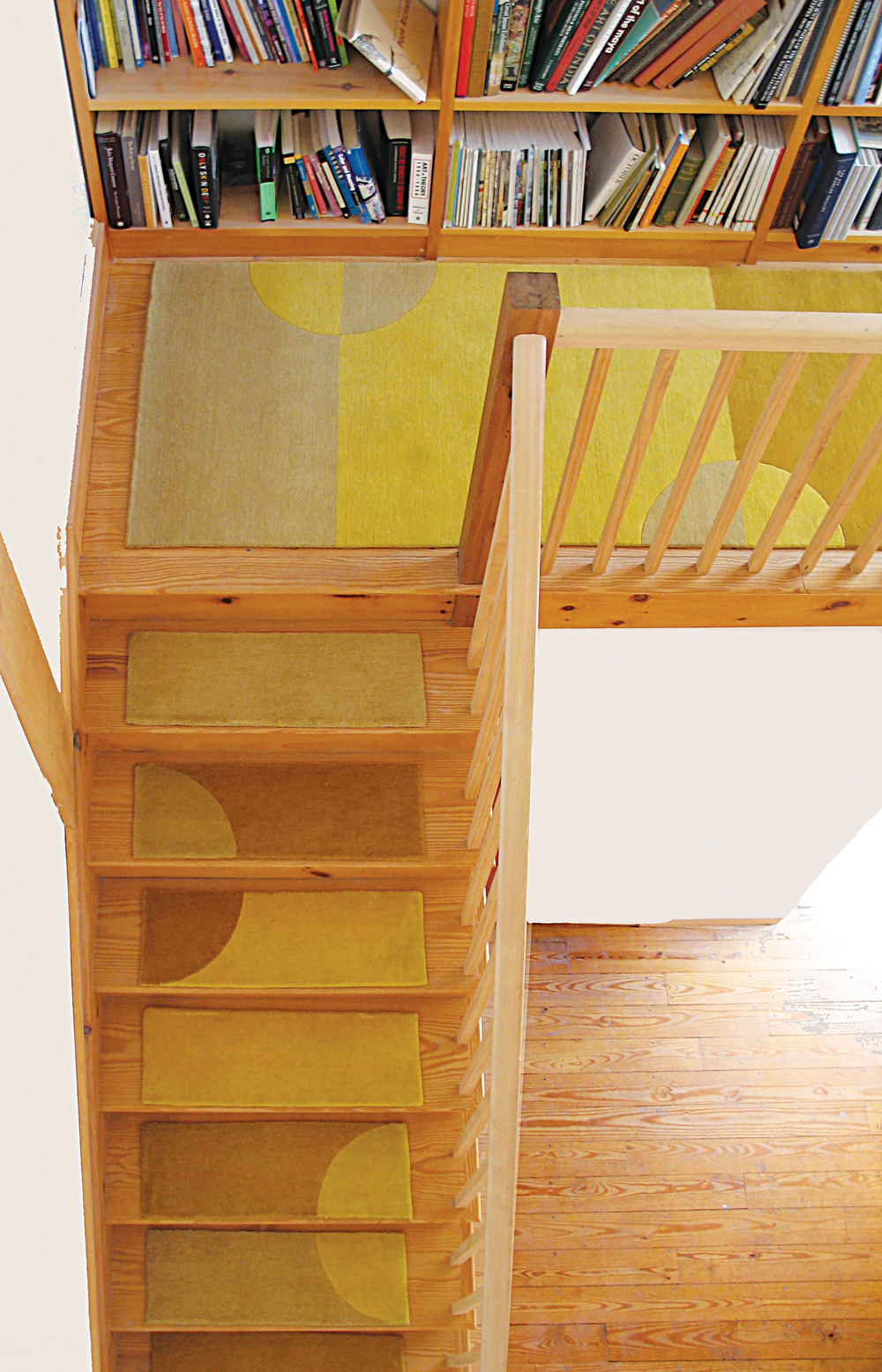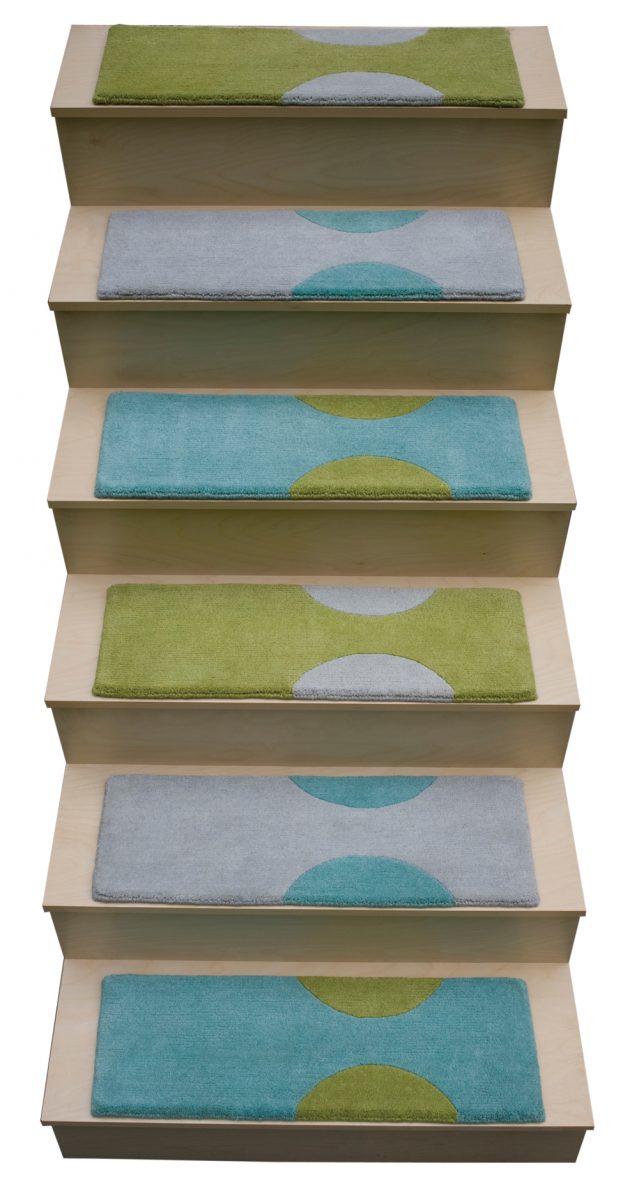Liza Phillips Design: Modular Stair Runners
By Tracy Kaler | Fall 2021 | Makers
“The best ideas arrive because you need something for yourself and it hasn’t been invented yet,” says Liza Phillips, founder of Liza Phillips Design, the Narrowsburg studio where she designs area rugs handmade in the Kathmandu Valley of Nepal.
When Phillips removed an old rag runner from the steps of her upstate home, instead of installing another stair runner, she envisioned an individually bound rug on every tread.
“That could be a modular idea,” she thought at the time. And so “Alto Steps”—a collection of handmade tread rugs with designs ranging from textures to stripes to geometrics—was born.
An unexpected name for area rugs, Alto Steps is based on a musical concept, according to Phillips. “It’s a transition from one floor to the next like a musical scale, an octave.” The entrepreneur debuted the line in 2006 with just three patterns, but Alto Steps has grown steadily since. These days, she offers 18 in-stock choices as well as countless custom options, with bespoke styles coming to fruition through her partnerships with interior designers and the public.
“Most of my clients—designers and individuals—already like some of the designs and need an adaptation of the col- ors in my collection,” she says. “I create new designs, but they are based on my aesthetic.” And while Phillips doesn’t shy away from color, she is drawn to certain hues. “I steer clear of red and prefer orange and green and an earthier palette.”
From Consumer to Creator
Originally from Washington, DC, Phillips spent much of her time in New York City before settling upstate in 2004, also when she launched Liza Phillips Design, which one could say was kismet. In 2001, the entrepreneur was living and work- ing part-time in Manhattan, but purchased a Craftsman-style farmhouse in Narrowsburg. On the hunt for an area rug to brighten the home’s dim living room, she wandered into a Greenwich Village shop only to discover a rug she loved. But to her surprise, the store owner suggested she design her own rug. Thereafter, Phillips went on to create a multicolored Mondrian-themed carpet for her home upstate. “That was the first rug,” she recalls. “The owner invited me to design a few more rugs that he would put in his shop’s window, and so I started the business.”

Treads from Liza Phillips Design’s Solana collection.
Even though floor coverings were new territory for Phillips, creativity was not. She majored Art History at Vassar College before receiving her MFA from Chelsea College of Art and Design in London. As an artist, she had painted, sculpted, and made prints her entire life, but it was her art and decor-inspired upbringing that led her to the world of interiors. “My grandparents and parents collected a lot of modern furniture, and that was a huge influence for me,” she muses. “The shapes were fantastic! The way I design rugs and the way I go about paintings feels innate in many ways.”
Hitting the High Note
Phillips gleans some of her inspiration from everyday life. For instance, she came up with one of her patterns while cross-country skiing, snapping a photo in the woods.
“Barberry bush branches against the snow were stark and beautifully graphic,” she remembers. ‘Barberry’ designs are based on that.”
All of her rugs are hand-knotted and most are constructed from Himalayan wool, as it’s the most resilient and sustain- able fiber. But some are hemp or nettle (a weed plant grow- ing throughout the country), and others include silk. As an importer, her company remains committed to environmental and fair trade practices and is a certified member of GoodWeave International (formerly Rugmark), a network of nonprofit organizations devoted to stopping child labor in the rug industry and encouraging education. A portion of her brand’s profits goes to schools in India and Nepal.
While the Alto Steps collection features unique motifs, showcases the natural beauty of wood, and blends aesthetically with myriad design styles, these individual carpet pieces are meant to be functional. Ultimately, they soften impact and noise, and prevent people and pets from slip- ping on the stairs. A special adhesive grips the textile to the wood tread without damaging it, holding it securely in place. Phillips says carpet tape also works well. “We are concerned about making stairs safer than they were before,” she adds.
The designer treads are sold in sets of 12 or as individuals and can be mixed and matched to create unique combinations. The standard size is 26 inches by 9 inches with wider steps measuring 36 inches x 9.5 inches. Prices start at $97 for a single step and $1,112 for 12 treads and go up from there. Flatweaves are less expensive, starting at $45 per tread. Custom sizes and shapes, such as winders, are avail- able, too. Standard sizes can ship as quickly as a week, with custom orders taking up to 14 weeks or longer.
To see her work in person or create a bespoke design, make an appointment to visit the Narrowsburg studio.
